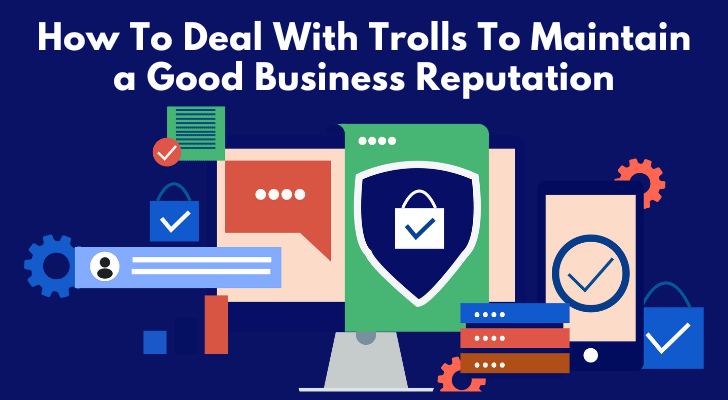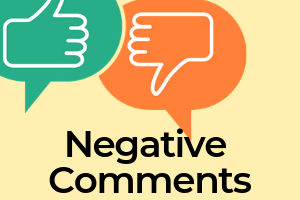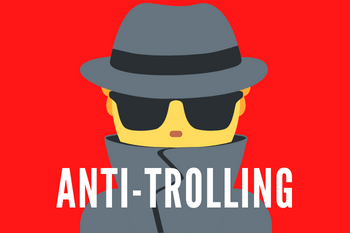Social media and online reviews are great for businesses to interact with consumers, but they can also become breeding grounds for trolls. Sadly, there are people who have nothing better to do than take pleasure in attacking or harassing people online without contributing anything of value. It wouldn’t be a problem if all the rest of us could simply ignore them. But unfortunately, those sad losers create significant problems for businesses. Particularly small business owners who rely on customer feedback and reviews to stay afloat suffer from nasty comments made by trolls.
So how can we deal with trolls in order to protect our business reputations and customer relationships? Let’s find out the strategies so we can remain professional and maintain a good reputation even when faced with malicious attacks.

What Is Trolling?
In general, a troll is someone who deliberately posts inflammatory, offensive, or disruptive content online with the sole purpose of provoking a reaction from others. Trolls enjoy causing arguments and chaos, and they also do it to spread hate or misinformation. Most of them do it anonymously, so they don’t care about the consequences of their actions. Trolling is a serious matter and can constitute a criminal offence, although technically, trolling is not a crime under federal law.
While it's impossible to eliminate trolls from your online presence completely, there are some things you can do to minimize their impact and protect your business reputation.
What’s The Difference Between a Troll and a Cyberbully?
Bullying someone means intimidating or coercing. Whether they have psychologically malicious intent or not, a troll can be a cyberbully and vice versa. While there’s very little difference between these two terms, one can only bully an individual, not an organization. Therefore the term “cyberbully” is referred to when someone attacks an individual online, while “troll” is referred to when they attack either an individual or a company.
How Do They Damage Your Brand?
Trolls try to damage brand reputations in a few ways.
1. By nitpicking every social post:
This is probably the most popular type of trolling and the most difficult to get rid of. They keep leaving a childishly negative comment on every social post.
For example, if you say, “If you have small children, why don’t you take them to your aquarium?” They will retort, “Single mothers don’t have time or money for that.”
The problem is that they not only attack your business but they attack your customers/fans who try to protest, making the post thread lengthy and unreadable.
2. By creating negative content about the business:
This could be in the form of writing bad reviews, posting negative comments on social media, or even creating hoaxes or false rumors.
This type of content can damage the business's reputation and make it harder for them to attract new customers.
3. By spreading false information about the business:

They claim that the business is going out of business, that the products are inferior, or that its employees/team members are behaving unethically.
This type of misinformation can damage the business's reputation and make it harder for them to retain existing customers.
4. By attacking particular team members:
They repeatedly send threatening or harassing messages, post personal information about particular employees online, or even make physical threats. This type of behavior can make it harder for businesses to attract and retain talented employees.
Ways to Deal with Trolls
If you think someone’s action or comment online is damaging your brand, then first, you can confront them. Be polite as any business owner should be, and ask them if they’re unhappy with your service. Do it in a calm and collected manner.
How they respond to you next will determine whether they are a troll or not. If their response makes no logical sense, then they are a troll. Waste time no more, and do the following.
1. Never React
Don't rise to their bait, and don't get drawn into an argument. Logical arguments will serve no purpose to them, so the best way to deal with them is to stop reacting, and never engage again.
The only aim of trolls is to provoke, i.e. cause emotional devastation to their victims. So Any form of reaction will trigger them to provoke further.
2. Set Out an Anti-Trolling Policy

Create an anti-trolling/cyberbullying policy page on your website that says;
- Your business value your customers’ feedback, opinions and suggestions.
- You will take complaints from your customers seriously, and try to resolve any issues as best as you can.
- However, harassing comments repeatedly posted by the same person will be carefully reviewed.
- You have the right to bar them if you consider them trolls. You have the right to block them and ban them from rejoining the community to protect your business and protect your customers.
- And you will have no hesitation but to report their actions to the authorities.
2. Block Them
Trolling comments can be blocked by disallowing their particular IP address. If it’s an online community or a social media thread, you can easily report their action as “spam”, “harmful”, or “harassment” to the administrator and block them.
If you consider it necessary, tell others (the other users in the thread or customers) that you have blocked the person to safeguard business relationships as per your anti-trolling policy, with the link to the policy page.
Whatever you do, once you’ve decided they are a troll, don’t communicate with them directly.
Report a Troll to Authorities
If you and your business are being harassed by a troll, there are a few things you can do to protect yourself and report the troll to authorities.
- First of all, document the trolling behavior. Keep a record of all the hateful or threatening messages you receive, as well as any other information that might be useful, such as the troll's username, IP address, and email address.
- Reach out to the online service where the trolling is taking place and report the user. Most platforms (social networks, message boards, gaming sites, etc.) have policies against harassment and will take action if they receive a complaint.
- You can also contact law enforcement if you feel like you're in danger. If the troll is making threats of violence or publishing private information about you, that is more than trolling, but should be considered stalking or harassment and can be reported to the police.
What Authorities Can (Not) Do About Trolls
Trolls don’t just use fake names and hide any sign of identity, but those who know what they’re doing usually use a VPN (Virtual Private Network). It means their IP address cannot be tracked, which makes it almost impossible for the authorities to hunt them down and prosecute them.
The best they can do is work with social media platforms to try to prevent trolling before it happens. This might involve working with platform algorithms to detect and remove hateful or abusive content, or training moderators to spot and deal with trolls.
We already know that authorities and media are trying to raise awareness of the problem of trolling, cyberbullying, suicide prevention, etc., and educate people on how to deal with anti-social behaviors online.
Case Study: CyberCash Worldwide

During 2021, we were approached by an individual named “Anne Garrett/Anne Garret” from Atlanta, GA - sometimes with a single “t”, sometimes double “tt” - whose name was obviously fake.
First, this individual asked us to help her make money as she was suffering from the loss of income due to the pandemic. She also asked us the if the CyberCash Worldwide members were “vaccinated”, to which, we mistakenly answered yes to. Anne Garrett overreacted, saying we were “demonized”, that’s when she started sending crazy messages by email (over 200 of them), via our contact form, and leaving Covid-related comments on our social pages.
We blocked her email address and reported her actions to the admin of each social network (Instagram and Facebook).
We also explained our situation to our followers. We are happy to chit-chat with anyone who’s in contact with us, even if the subject is not directly related to our business. But there’s a borderline and TPO. We cannot discuss certain topics, such as political, religious, or controversial. We received messages of applause from our followers in support of how we did (i.e. did not react to the troll directly.)
While we should have completely ignored Anne Garrett’s question about the Covid vaccine, we swiftly chose to ignore all the communications from her and managed to stop her trolling any further.
Conclusion
Trolls are nothing but a waste of your time and energy. You will waste your precious time the minute their comment comes into view. Your word against them will only fuel their fire and they will likely move on to someone else who will give them the attention they crave.
You have many more important things to do to improve your business. Therefore the best course of action is to ignore trolls completely. As soon as you are aware of a troll, attempt to get rid of them without acknowledgement.

 Positive Vibes
Positive Vibes  (@cybercashworldwide)
(@cybercashworldwide)